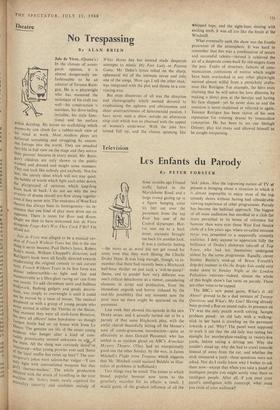Les Enfants du Parody
Television
By PETER FORSTER Last week they showed this episode in the new Drake series, and it actually' turned out to be a parody of that same Hitchcock play, with the awful cherub beautifully hitting off the Master's note of comic-gruesome introduction—quite as effectively as does Donald Pleasence, who has settled in as resident ghoul on ABC's Armchair Mystery Theatre. (They had an exceptionally good one the other Sunday, by the way, in James Mitchell's Flight from 7'reason, which suggests that Mr. Mitchell could succeed Balchin as illus- trator of problems in boffinland.) Two things may be noted. The extent to which broad, popular humour now turns to -the genuinely macabre for its effects—a result, I would guess, of the gradual influence of all the 'sick' jokes. Also the ingrowing nature of TV at present is bringing about a situation in which it, is almost impossible to enjoy most of the top comedy shows without having had considerable viewing experience of other programmes. Parody has become the habitual approach. The biggest of all mass audiences has enrolled in a club far more parochial in its terms of reference for humour than were ever those West End theatre clubs of a few years ago, where so-called intimate revue was presented to a supposedly minority audience. I defy anyone to appreciate fully the brilliance of Drake's elaborate take-off of Top Town, who had not themselves undergone ordeal by the same programme. Equally, clever Stanley Baxter's send-up of Bruce Forsyth's drip-dry manner in On the Bright Side could only make sense to Sunday Night at the London Palladium veterans—indeed, almost the whole of this bright show's fun turns on parody. There are other veins to be tapped.
The BBC's new panel game, What's It All About? proved to be a dud mixture of Twenty Questions and What's My Line? Having already been proved a flop on sound radio, its presence on TV was the only puzzle worth solving. Sample problem posed: an old lady with a walking- stick in her hand is crawling on the pavement towards a car. Why? The panel were supposed to work it out that the old lady was testing her eyesight for numberplate-reading at twenty-five yards, before taking a driving test. Why she couldn't stand up, why she had to crawl towards instead of away from the car, and whether the stick measured a yard—these questions were not asked. Nor do I really know why 1 bother to ask them now—except that when you take a panel of intelligent people you might surely treat them as intelligent people. After all, if you treat your panel's intelligence with contempt, what must you think of your audience?






















































 Previous page
Previous page